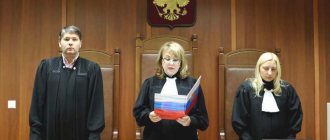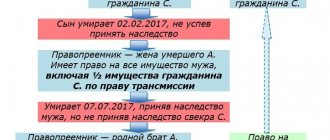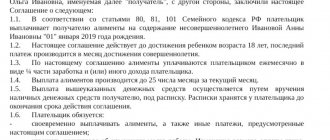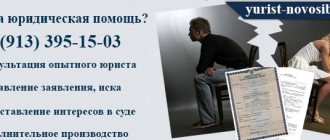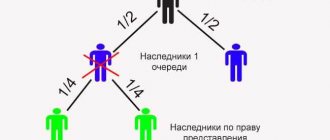Author of the article: Yulia Kaysina Last modified: January 2021 9220
Lawyers working with cases related to inheritance law sometimes have to face questions like: what to do if the heir died before the testator? How is the inherited property divided in this case and who has the right to claim it? This article will provide complete information on these issues, taking into account all the nuances that may arise during the division of property.
The legal heir died before the testator
If this situation arises, you need to pay attention to the following factors:
- the deceased is a legal heir, that is, he has family ties with the testator;
- the successor died before the testators or at the same time as him;
- the testator did not draw up a testamentary act during his lifetime.
In this case, the law regarding succession, that is, the transfer of inheritance rights to the descendants of the successor by law, comes into force.
Important! Based on the Civil Code of the Russian Federation, if the legal heir died earlier than the testator or at the same time as him, then the inheritance rights of the deceased will be received by his descendants on the basis of a legislative act on succession.
Simply put, if the testator died before the testator, then his inheritance rights will be taken over by his children, brothers/sisters, grandchildren, nephews/nieces.
This feature applies only to the first three circles of the hereditary queue:
- If the heir of the first circle of succession dies, the inheritance will be given to the grandchildren of the testator. One of the most common examples of succession includes the transfer of inheritance rights specifically to natural or adopted children;
- If the recipient of the second round of priority dies, the property will be transferred to grandparents or nephews/nieces. If the heir by law dies earlier than the testator, and at the same time he belongs to the second circle of priority, and he did not have children, parents or a wife/husband, his part of the inheritance passes to the descendants represented by nephews and grandparents;
- If the heir of the third circle of succession dies, his share of the property will be transferred to his cousins/brothers. In this case, the principle of division of property will be similar to those described above. If the deceased testator has a third-ranking heir who died, then the inheritance will pass to his descendants, in other words, to the testator’s cousins/brothers.
Expert commentary
Shadrin Alexey
Lawyer
These rights apply only to successors belonging to the first three circles of succession. If the deceased heir was a representative of the rest of the line, then his inheritance rights do not pass to another person.
Drawing up an application
The application in the form of a claim is drawn up on an A4 sheet. It should have a clearly defined form that you can see on the Internet. We also recommend that if you do not have experience in drawing up statements of claim, you contact a lawyer.
Your application must have several points:
- The first of them indicates the passport details of the plaintiff and defendant.
- You must also indicate the reason why you went to court.
- Referring to laws and articles, you must indicate how you see the solution to the problem.
- Ask the court to look into your case.
- Make a list of documents in list form.
- Put the date and signature.
- A receipt for payment of the state fee must be attached to the statement of claim; without it, your application will not be considered.
The beneficiary of the will died before the testator
If the deceased testator made a will during his lifetime, then the situation with inheritance develops in a completely different direction.
The difference between inheritance on legal grounds and on the basis of a testamentary act is that the testator, having learned about the death of his chosen heir, can make changes to the document or cancel it altogether. In simpler terms, the testator draws up a new testamentary act and indicates another successor, or he appoints a replacement heir in advance. The sub-designated successor is the person who receives inheritance rights to the property of the testator in the event of the death of the main successor. An unlimited number of heirs can be selected and nominated.
But it also happens that the testator cannot or does not have time to make changes to the testamentary act to replace the recipient. In this case, everything will depend on how many heirs the testator bequeathed his property to.
If the document was issued for one heir, then the property will be distributed legally among all heirs according to the circle of succession. If there are no heirs, then the property will become the property of the state, and the will will be annulled.
If there are two or more heirs, then the inherited property, which should have become the property of the deceased heir who died before or together with the testator, will be divided among the remaining heirs, in the parts specified in the document.
Documentation
- Provide your passport and make a photocopy of it.
- It would also be useful to provide documents that indicate that the previous heir has assumed his legal rights.
- Attach the will document, if available.
- Be sure to include documents on ownership, if any, as well as receipts for payment of state fees.
- In some cases, you may be asked to provide other documents that will apply in a given situation.
Death of the receiver after inheritance
To avoid problems with the division of inheritance and to be sure that after death the will of the testator will be fulfilled, he must not only think about the heir, but also about the sub-designation of his successor. In this situation, if the main heir managed to enter into the inheritance, but did not have time to fully accept it due to his death, then his rights can be transferred to the successor who is indicated as the second applicant. By appointing a backup heir in advance, the testator will be able to solve many problems associated with the struggle for his property.
Expert commentary
Leonov Victor
Lawyer
The death of a person who has entered into an inheritance, but has not fully accepted it, gives the opportunity to lay claim to the property not only to the heirs of the testator, but also to the successors of the deceased heir.
The latter can receive rights to inheritance both according to the will and legally. The new heir, after assuming his rights, has the right to dispose of the received property, regardless of how much time has passed since its receipt.
Deadlines for receiving an inheritance
Most people know that the inheritance is divided after six months have passed from the date of death of the testator, but many people misinterpret this provision. You should know that during this period you must submit an application to the notary about your desire to receive part of the property of the deceased.
Mandatory before the end of the six-month period! Otherwise, you will have to extend the deadline through the court, and it is not a fact that you will succeed, since you need to prove that the reason for the delay is valid and document this.
Death of a successor who did not enter into inheritance
If the heir has died without having time to receive inheritance rights to the property bequeathed to him, then upon his death, his part of the property will be distributed using hereditary transmission, which is a transfer of ownership rights to the person who is the legal successor of the deceased heir.
This right comes into force in the following cases:
- absence of a consent application for acceptance of property;
- unconfirmed fact of use of the received property.
To obtain inheritance rights, you must collect the documents submitted:
- death certificate of the testator;
- death certificate of the main successor, if he died earlier than the heir;
- a document confirming relationship with the deceased heir;
- a certificate from the Housing Office about the last place of residence of the testator;
- certificate of family composition.
If the deceased heir has no heirs, then his share will be legally distributed among the heirs according to the circle of succession.
Expert commentary
Shadrin Alexey
Lawyer
A testamentary act is not a static document, since the testator can change its contents or cancel it altogether. According to Article No. 1130 of the Civil Code of the Russian Federation, in the event of the death of an heir, the testator can make changes to the document and appoint a new successor.
If there are several applicants and one of them is dead
If one of the heirs has died, but there are others, then the issue of the deceased’s share is resolved. If there is a will and the first heir has no relatives, the share is divided equally among the remaining heirs in proportion, thus leaving no voids in the inheritance.
Important! If the deceased has relatives, they become full participants in the inheritance process.
The site has useful information about who the commorients, unworthy and heirs by right of representation are under the law. It is also important to know about the peculiarities of inheritance by minors and whether disabled people have the same rights to inheritance as healthy people.
Other situations
If several heirs are indicated in the testamentary act and the testator does not want to change the contents of the document, then after his death, part of the property of the previously deceased heir will be distributed in equal parts among the remaining heirs.
Important! If the heir and the testator die at the same time or with a slight difference in time, in this case the will is invalid. Inherited property is divided between persons who have family ties with the testator, and during distribution, the interests of the heirs who have the right to a compulsory inheritance share are taken into account.
How is an inheritance formalized through hereditary transmission?
Acceptance of an inheritance in the order of hereditary transmission and its registration is carried out on a general basis (read the article entry into inheritance ).
In this case, the heir can simultaneously accept:
- The inheritance that the direct heir of the first testator did not have time to accept due to his death - in the order of hereditary transmission
- An inheritance opened after the death of the second testator, whose direct heir he is - on a general basis
However, to do this, you need to submit two separate applications for acceptance of inheritance in the order of transmission and in the general order, respectively.
Moreover, the important point is the following:
- An application for acceptance of inheritance by transmission is submitted to the notary who opened the inheritance case after the death of the first testator
- An application for acceptance of an inheritance after the death of the second testator (deceased heir) is submitted to the notary at the place where the inheritance was opened. In St. Petersburg, such an application can be submitted to any notary; accordingly, the heir can contact the notary who is in charge of the inheritance case of the first testator
If both applications reach the same notary, including due to the coincidence of the place of opening of the inheritance of both testators, in any case, two separate inheritance cases will be opened, which will be conducted separately, and all notarial actions within each will be carried out separately.
If you still have questions on this topic, or your situation is too complicated and you cannot evaluate it yourself, call and get detailed advice from an inheritance lawyer .
It should be noted that you can get the most accurate and comprehensive information for yourself during a face-to-face consultation, which takes place at the company’s office.
The initial consultation is always free. If you need to study a lot of documents and carefully analyze them, you may be provided with a paid consultation, during which you can receive a step-by-step algorithm of actions, including a written one.
Call and sign up for a consultation, our experienced inheritance lawyers in St. Petersburg are ready to answer all your questions and provide practical assistance in resolving the most complex inheritance disputes.
Introduction
After the death of a citizen, an inheritance opens.
It consists of the personal property of the deceased, registered as his property during his lifetime. And, according to Art. 1110 of the Civil Code of the Russian Federation, the rights to this property pass to the heirs of the deceased, whose circle is determined by law or will. By law, relatives and family members of the testator are called upon to inherit. All of them are divided into seven groups according to the extent of blood or family ties.
The first group has priority. It includes those closest to you: children, parents, spouse. They become successors immediately after the death of a relative, and only their absence or unwillingness to accept the property of the deceased makes it possible for the second group to acquire it.
The second group, or, as it is more often called, the queue, consists of the grandparents, brothers and sisters of the testator. On the same basis as the first, they transfer their inheritance rights to third-line applicants - uncles and aunts of the deceased.
Next, the calling to succession of the remaining four groups of heirs occurs in the following sequence:
- parents' grandparents;
- children of nephews, uncles and aunts of parents;
- grandchildren of nephews, children of cousins, cousins of parents;
- step-children and not adopted children of the official spouse, the spouse of the parent.
The current inheritance group, along with its participants, includes the dependents of the deceased.
But the owner does not always agree with the procedure established by law. And this is his right. In accordance with Art. 1118 of the Civil Code of the Russian Federation, every capable citizen can leave posthumous orders and indicate in them preferred successors, divide property between them and indicate the conditions for its transfer. And his last will during inheritance will be decisive.
A successor under a will can be:
- any individual who is alive at the time of the testator’s death or born within 9 months after the opening of the inheritance;
- a legal entity existing on the day of opening of the inheritance;
- Russian Federation, its subject, municipality;
- international organization;
- foreign state.
In addition to appointing successors, the testator has the right to appoint others who, in the event of the death or refusal of the first, will receive the property due to them. If this is not done, the unaccepted share of the property is redistributed among other persons appointed in the will or, in their absence, the legal regime of inheritance comes into force.
When does the transmission fail?
After the death of the applicant, disputes often arise due to ignorance of the principles of redistribution of inheritance rights. The determining factor is the ratio of the dates of death of the testator and the successor. If the last one died first, there can be no talk of transmission, since it is considered that the inheritance remains intestate, even if the person is indicated in the will. But there is an additional number of cases when the transmission mechanism cannot be used.
Missing a deadline
After the opening of the inheritance case, six months are allotted for the procedure. The period will be reduced to three months, based on the fact that there is only one applicant. After the death of the heir, you must contact a notary within this period. Otherwise, you will have to file a statement of claim. 3 years are allotted for this. This is the general limitation period under the Civil Code.
In exceptional cases, a claim is accepted later, but there must be special reasons for this. An heir who died after the opening of the inheritance leaves the property due to his descendants, but if all the deadlines are missed, the transmission does not work, it is no longer possible to use the material benefits and the claim will be left without consideration. To prevent this from happening, contact a lawyer in a timely manner and initiate the inheritance process.
The key points are the timing of entry and the method. When death takes away a legal successor, relatives of the same line become applicants. These are not only people who are blood related to the deceased. A valid marriage (at the time of the events) or adoption are also sufficient grounds for receiving an inheritance. A will changes the rules of distribution, and everything is decided by the terms specified in the text.
Mandatory share
When dying, the testator leaves an inheritance to the persons specified in the will and relatives, as well as obligatory claimants. The last category includes minor children, disabled parents and dependents who support the deceased in the last year of life. Without having time to accept the obligatory share, the heir deprives his children of the opportunity to use the transmission.
Simultaneous death of testator and heir
If the day of opening of the inheritance coincides with the date of death of the heir, the transfer of valuables to the latter’s relatives is excluded. This situation is equivalent to the case when there was no successor even before the time of accession. It is considered that the estate is not willed. The relatives of the successor have no right to claim the share that would have been transferred to him by right of inheritance if his life had not been cut short so early.
The heir left a will
It is better to consider this case with an example. Relatives learned that the head of the family managed to write a will for all the property acquired during his lifetime and died. Before this, his father passed away, from whom the inheritance remained. Relatives cannot lay claim to valuables if the will states that everything must be transferred to a third party. To cancel this fact, it is necessary to obtain the annulment of the will through the court.
Features of the testamentary process
The will is opened after the death of the maker in the presence of a lawyer and interested citizens. There may be several of these; values are distributed among them in accordance with the instructions left.
To gain rights, these persons must:
- provide a certificate of death of the testator;
- provide a court order recognizing the owner of the property as deceased;
- identification.
A document is recognized as valid only if it is certified by a notary. When compiling it, secrecy is maintained, therefore it is advisable not to disclose its existence to anyone except trusted persons. It is better to store it in a notary office or a safe deposit box. The drafter has the right to appoint not only legal successors, but also executors of his will.
Important
All relatives have the right to the property of a deceased person by law. In this case, the first in line are the spouse, children and parents. If there are none, the property is transferred to brothers, sisters, aunts, uncles, and so on in order. If the heir dies, then this circumstance introduces significant confusion into the testamentary process.
Rules of inheritance upon death of an heir
If an heir under a will dies, then his part goes to close people. But the forms of redistribution of shares depend on the time and circumstances of the death of the successor:
- died before the death of the testator;
- died on the same day as the testator;
- died after opening the will without accepting the inheritance;
- entered into an inheritance before his death.
In Russia, inheritance is transferred in two ways - by will and by law. The documented will of the deceased takes precedence. Its exact execution is violated only by the presence of obligatory heirs, whose interests were not taken into account.
When there is no will or is declared invalid, a law comes into force requiring that the inheritance be distributed among legal successors of the same degree of kinship. Direct heirs are parents, spouse and children (also adopted children).
If an heir under a will dies before the testator, then the testator has the right to indicate in the document another candidate to whom the rights of the deceased will be transferred (Article 1121 of the Civil Code of the Russian Federation). Then the second candidate turns to the notary and inherits according to the usual procedure. But not everyone does this.
Example: Elena Vasilievna bequeathed a house and land to her nephew and appointed her own sister in the event of his death. And so it happened - the sister inherited the property.
The day of opening of the inheritance of the Civil Code of the Russian Federation determines the date of death of a citizen or recognition of such a fact by the court. From now on, candidates for possession of his property have the right to apply in writing to the notary's office near the last address of the deceased and declare rights.
In the expression of will, the author has the right to indicate those persons whom he does not want to see among the legal successors under any circumstances. If a court decision recognizes a person as an unworthy heir, then he is also excluded from the list of applicants for the inheritance (Article 1117 of the Civil Code of the Russian Federation).
The heir dies before the testator
If an heir under a will dies before the testator, then his share is not transferred to those who are also included in it. This part of the inheritance is considered intestate and, by law, goes to representatives of the first stage or subsequent degrees of kinship (Articles 1142-1145 of the Civil Code of the Russian Federation).
Example. Vera Petrovna died, bequeathing her apartment and car to her husband and his son from his first marriage. The husband died shortly before his wife and her will remained unchanged. Vera Petrovna's closest relatives are her mother and father. They will share among themselves the share that their son-in-law would receive. The second part goes to the husband's son.
After the death of the son or daughter of the testator, the inheritance mass is transferred to the grandchildren by right of representation (Article 1146 of the Civil Code of the Russian Federation). For example, Zakhar Pavlovich died before the death of his father Pavel Vasilyevich, who bequeathed all his property to him and his brother. Zakhar Pavlovich is survived by a son and daughter, who are the deceased’s grandchildren. They receive the inheritance instead of their father, along with their uncle.
The heir died without making a will
The citizen died soon after the person who included him in the will, but did not have time to enter into an inheritance after 6 months allotted by law. Then the hereditary transmission begins to operate (Article 1156 of the Civil Code of the Russian Federation).
The rights to the property of the deceased are transferred to legal successors both by will and by law. When death overtakes a citizen less than 3 months before receiving an inheritance, then for his legal successors the period is increased by another 3 months, then by a court decision (Article 1155 of the Civil Code of the Russian Federation). The paperwork is completed as usual.
Example. Pavel Stepanovich planned to leave the house and car to his brother Oleg Stepanovich. But he died 4 months after him. Oleg Stepanovich was left with two sons, to whom he, in turn, bequeathed his property in his will. His children turn to a notary and open two inheritance cases.
The obligatory heirs of the deceased are not owed anything (Article 1149 of the Civil Code of the Russian Federation).
When a person has managed to enter into an inheritance, having received a notarial certificate, the acquired property is inherited by the successors in the manner provided for by Russian legislation.
The heir died at the same time as the testator
When a person written in a will passes away on the same day as the testator (death on the same day is considered simultaneous), then they do not transfer the inheritance from one to the other. Close people open separate inheritance cases with a notary and receive what is due to them by law or included in the wills of the deceased (Clause 2 of Article 1114 of the Civil Code of the Russian Federation).
Example. A childless husband and wife crashed in the mountains. Each wrote into each other's will. Then the wife's inheritance will be received by her parents, and the husband's - his.
